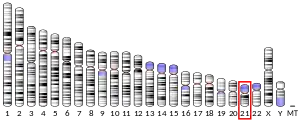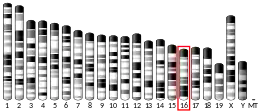LTN1
Listerin E3 ubiquitin protein ligase 1 (LTN1), otherwise known as listerin, is a protein that in humans is encoded by the LTN1 gene.[5]
| LTN1 | |||||||||||||||||||||||||||||||||||||||||||||||||||
|---|---|---|---|---|---|---|---|---|---|---|---|---|---|---|---|---|---|---|---|---|---|---|---|---|---|---|---|---|---|---|---|---|---|---|---|---|---|---|---|---|---|---|---|---|---|---|---|---|---|---|---|
| |||||||||||||||||||||||||||||||||||||||||||||||||||
| Identifiers | |||||||||||||||||||||||||||||||||||||||||||||||||||
| Aliases | LTN1, C21orf10, C21orf98, RNF160, ZNF294, listerin E3 ubiquitin protein ligase 1 | ||||||||||||||||||||||||||||||||||||||||||||||||||
| External IDs | OMIM: 613083 MGI: 1926163 HomoloGene: 32272 GeneCards: LTN1 | ||||||||||||||||||||||||||||||||||||||||||||||||||
| |||||||||||||||||||||||||||||||||||||||||||||||||||
| |||||||||||||||||||||||||||||||||||||||||||||||||||
| |||||||||||||||||||||||||||||||||||||||||||||||||||
| |||||||||||||||||||||||||||||||||||||||||||||||||||
| |||||||||||||||||||||||||||||||||||||||||||||||||||
| Wikidata | |||||||||||||||||||||||||||||||||||||||||||||||||||
| |||||||||||||||||||||||||||||||||||||||||||||||||||
Function
Like most RING finger proteins, listerin functions as an E3 ubiquitin ligase.[6] Listerin is a component of the ribosome quality control complex.[7][8]
References
- GRCh38: Ensembl release 89: ENSG00000198862 - Ensembl, May 2017
- GRCm38: Ensembl release 89: ENSMUSG00000052299 - Ensembl, May 2017
- "Human PubMed Reference:". National Center for Biotechnology Information, U.S. National Library of Medicine.
- "Mouse PubMed Reference:". National Center for Biotechnology Information, U.S. National Library of Medicine.
- "Entrez Gene: Listerin E3 ubiquitin protein ligase 1".
- Chu J, Hong NA, Masuda CA, Jenkins BV, Nelms KA, Goodnow CC, Glynne RJ, Wu H, Masliah E, Joazeiro CA, Kay SA (February 2009). "A mouse forward genetics screen identifies LISTERIN as an E3 ubiquitin ligase involved in neurodegeneration". Proceedings of the National Academy of Sciences of the United States of America. 106 (7): 2097–103. doi:10.1073/pnas.0812819106. PMC 2650114. PMID 19196968.
- Shao S, Brown A, Santhanam B, Hegde RS (February 2015). "Structure and assembly pathway of the ribosome quality control complex". Molecular Cell. 57 (3): 433–44. doi:10.1016/j.molcel.2014.12.015. PMC 4321881. PMID 25578875.
- Shao S, von der Malsburg K, Hegde RS (June 2013). "Listerin-dependent nascent protein ubiquitination relies on ribosome subunit dissociation". Molecular Cell. 50 (5): 637–48. doi:10.1016/j.molcel.2013.04.015. PMC 3719020. PMID 23685075.
Further reading
- Rose JE, Behm FM, Drgon T, Johnson C, Uhl GR (2010). "Personalized smoking cessation: interactions between nicotine dose, dependence and quit-success genotype score". Molecular Medicine. 16 (7–8): 247–53. doi:10.2119/molmed.2009.00159. PMC 2896464. PMID 20379614.
- Shao S, Brown A, Santhanam B, Hegde RS (February 2015). "Structure and assembly pathway of the ribosome quality control complex". Molecular Cell. 57 (3): 433–44. doi:10.1016/j.molcel.2014.12.015. PMC 4321881. PMID 25578875.
This article incorporates text from the United States National Library of Medicine, which is in the public domain.
This article is issued from Wikipedia. The text is licensed under Creative Commons - Attribution - Sharealike. Additional terms may apply for the media files.



